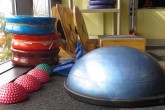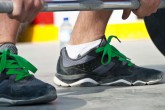
Gravity can be a pain in the neck. Seriously—the effects of gravity can cause neck, back, spine, and joint pain. This is especially true if you’re injured. And when you look at rehabilitation, gravity’s effects could make participating in land-based physical therapy challenging, so much so, that you might decide to take these gravitational challenges to the pool—and heck, while you’re at it, why not sip some lemonade and catch some rays?
All jokes aside, aquatic therapy (i.e., physical therapy in water) is an ideal treatment option for many patients. You might not be cooling off with a summery drink or soaking up some sweet vitamin D from the sun, but exercising in the pool will help you build muscle, increase flexibility, and improve range of motion by taking advantage of the water’s natural buoyancy and resistance. Depending on the severity of your injuries, your therapist might have you use assistive devices. Think outside the box—for example, underwater treadmills are a real thing. (What? So cool!)
When you exercise in the water, your body doesn’t feel the effects of gravity like it would on land. (Whoever said “no pain, no gain” obviously never tried aquatic therapy!) Aquatic therapy sessions typically take place in heated pools, which promote muscle relaxation and increase circulation. But this is no hot tub sesh; aquatic therapy is hard work, but it definitely pays off with reduced pain and increased mobility.
Although both aquatic therapy and water aerobics take place in the pool, be advised that they are not the same thing. Water aerobics might include treading water and other resistance-based exercises with the primary goal being weight loss, not functional rehabilitation. You can do water aerobics on your own or as part of a group class. Aquatic therapy, on the other hand, is provided (and supervised) by a qualified physical therapist (PT) or physical therapist assistant (PTA). The therapist is a musculoskeletal expert and will develop a plan specific to you and your limitations. He or she can hold you accountable and adjust your plan as you progress. Within a few short sessions, you’ll be ready to towel off and continue down your rehabilitative path on dry land.
In addition to helping you graduate to land-based physical therapy (which offers more weight resistance), sticking to your prescribed aquatic exercise plan can improve your balance, coordination, strength, and power as well as increase your flexibility.
Think this type of therapy might float your boat? Use our GetPT finder to locate a clinic near you that offers aquatic therapy.


